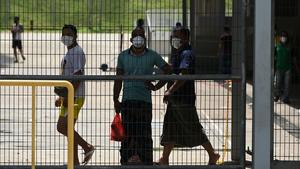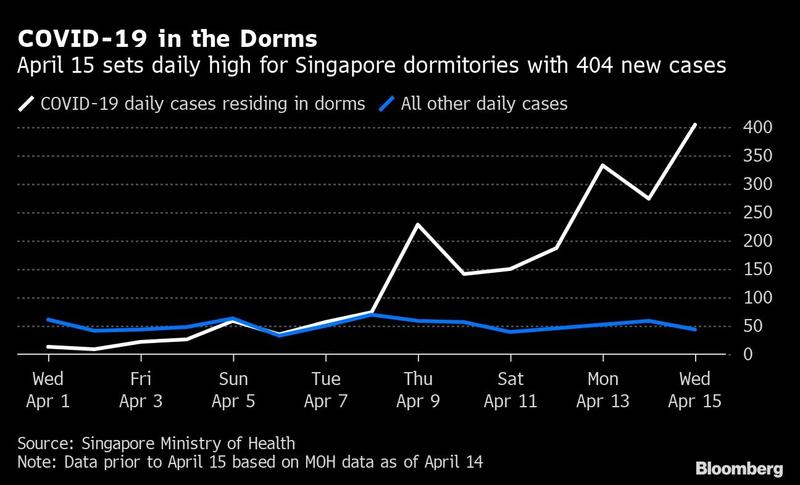 Foreign workers look out from a fence of the workers' dormitory in Singapore on April 9, 2020. (ROSLAN RAHMAN / AFP VIA GETTY IMAGE)
Foreign workers look out from a fence of the workers' dormitory in Singapore on April 9, 2020. (ROSLAN RAHMAN / AFP VIA GETTY IMAGE)
Singapore reported its highest daily increase of coronavirus cases on Wednesday as infections engulfed more dormitories housing low-wage foreign workers.
Authorities said an additional 447 cases were confirmed as of noon Wednesday, bringing the total to 3,699 in the country. Of the new cases, more than 400 infections - about 90 percent - are tied to facilities that house migrant workers in close quarters, according to a government statement. Workers in about 20 dormitories have been affected by the virus outbreak in Singapore, according to a Bloomberg analysis of government data.
We will work with them, especially those living in the dorms, to see through this difficult period
Lee Hsien Loong, Prime Minister, Singapore
ALSO READ: NZ likely to lower alert level after four-week lockdown ends
The city-state is grappling with a pace of infections that’s picking up among workers staying in the dormitories, at a time when it appears to be stabilizing elsewhere across the country. The government has tightened entry rules, mandated masks, poured billions of dollars into the economy and imposed a weeks-long partial lockdown to contain the outbreak.
Foreign workers have helped Singapore build its public housing towns, mass transit lines, airports and ports, Prime Minister Lee Hsien Loong said in a Facebook post Thursday. They also man midnight shifts in factories, and take care of the sick and elderly in hospitals and nursing homes, he said.
“Hundreds of thousands of Singapore households depend on domestic workers from neighbouring countries,” Lee said. “We will work with them, especially those living in the dorms, to see through this difficult period.”
READ MORE: Singapore readies 'floating hotels' for workers as virus spreads
 (BLOOMBERG GRAPHIC)
(BLOOMBERG GRAPHIC)
Close to 80 percent of Singapore’s workforce is now working from home as the city-state enters its second week of “circuit-breaker” measures, including the closure of schools and most workplaces. Imported cases have been cut to zero the last several days, while daily numbers of community spread have leveled off in the last two weeks.


